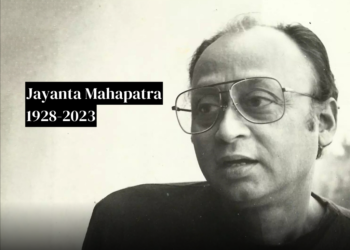two voices touch
one, basking in the soft sun
the other, bathed in starlight.

Firdaus’s face appeared on screen, crystal clear. It was as though the sun had stepped out of my room and entered his, trespassing through those blinds, making a light pattern on his face. Aliyah, his wife was dusting the house in the background and she appeared and disappeared from the screen like a familiar thought fluttering through the mind at intervals. She had informed me the previous day that the poet was not feeling too well.
‘Assalam alaikum,’ I greeted him. ‘Wa alaikumus salaam,’ he replied.
‘How are you?’
‘Well, nothing to complain about.’
‘What happened to you yesterday?’
He looked at his wife and asked, ‘What happened to me yesterday?’ A word or two from her jolted his memory. ‘Oh yes,’ he said, ‘I could not sleep at night. So after breakfast, I dozed off. Then woke up for lunch and went back to sleep,’ he smiled and continued, ‘so recently someone from Hyderabad got in touch with me. He is editing an anthology and wants two of my poems. The editor’s assistant asked me about the copyright. I said, that lies with me and that she could very well keep the poems. Then she enquired if I would charge a fee. I said, “no fee”. Tell me, what would I do with five dollars a poem?’ he looked amused.
‘Get another haircut,’ I said. He chuckled.
So what have you been writing? I asked.
‘Ah, nothing really for a change. I know I can write if I wish to but it is not my priority anymore. And what do I do writing? The essay I wrote a year ago has still not seen the light of day. The editors I approached are sitting on it, tight-lipped. No reply, not even a rejection letter! Anyway, I had promised myself five books over my career. I got more than I wished for. I have reason to be content.’
The thought of the poet not holding his pen was uncanny. ‘Write some more. You do it so well!’ I pursued.
‘We’ll see,’ and saying so he brushed off the topic in style. Holding up a book, he solemnly said, ‘I want you to read this book,’ then slowly added, ‘so that you may learn not to write like this.’ I burst out laughing. He chuckled.
‘This book is verbose. The author just doesn’t know where to stop. But mind you, he has a name,’ said the poet.
Fame comes with age, doesn’t it? I asked him.
‘Yes,’ he smiled ‘if it comes at all. Now I expect you to keep me updated with recent poets as I can’t do it anymore.’
‘Sure, this is what I am currently reading,’ I reversed the camera and his eye focused on the name, ‘Ma-no-har Shetty, Borderlines. Sounds interesting.’
‘Yes,’ I said, ‘his poems are crisp. Without any flab. And he too keeps alluding to different poets, like how I do. Listen to this—
He marvelled as he read
The simile of two cats
As ‘a pair of commas’.
But why did he also feel
A sense of regret?’
‘Ah, how many times have poets read such extraordinary metaphors and wished they were their own’ said Firdaus, ‘I know Manohar Shetty but we haven’t been in touch. His work is admirable. Years ago, when he was in Bombay, he ran a South Indian Restaurant.’
‘Really?’
‘Yes, it was a family business. Then he left for Goa. Anyway, have you been sending your poems elsewhere?’
‘Yes, to quite a few magazines. And I got two rejection letters already.’
‘I can see you smile,’ he said.
‘I feel happy when a magazine accepts my work but oddly enough I feel happier when they don’t. Then there is hope that it will find a better home.’
He gave a nod. Aliyah showed her face and said, ‘Well, we used to make multiple copies of manuscripts and send it to different places. Once in a while, when it got accepted anywhere, we would dance with joy, at least I would.’
‘Yes, Aliyah is right. Whenever a manuscript was returned, we’d change the envelope and send it off elsewhere. The first time I sent my book to Penguin, it got rejected. So the manuscript sat on my shelf for ten years. And then the editor changed and I sent it again. That’s when it was selected. So you know, these things are highly subjective. You should keep sending your work. You never know when someone might take a fancy to it.’
‘You waited for ten years!’ I exclaimed.
‘Little poet,’ he said, ‘it takes a lifetime to rest in the shade of your poems.’
I marvelled in silence.
‘I’ll let you go with that thought, little poet. Khuda Hafiz.’
‘Khuda Hafiz.’
~ Samreen Sajeda
When Peeradina penned the first word, he perhaps had little idea that he will be busy scribbling for half a century. So much so that when the senior poet was unable to wander outside as much, he began musing on subjects strewn across his home like the fruits decorating his dining table. Him describing the scent of oranges such that ‘an entire orchard has been packed into the single fruit’ arrests your senses as if you yourself are biting into it. Even more stunning are his set of object poems like the “Stapler” ‘borrowed’ for keeps, or the faithful “Shaving Brush” awaiting its fate at fifty. Not to forget the birds flocking over the bird feed in the poet’s backyard. And this sheer simplicity in his authorial choices is what makes him a gem of a poet!




